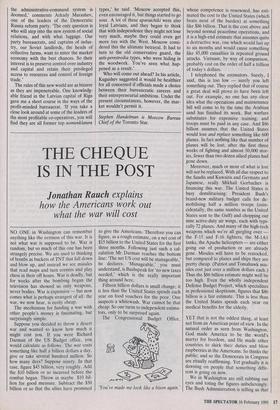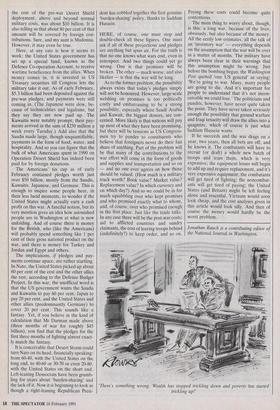THE CHEQUE IS IN THE POST
Jonathan Rauch explains how the Americans work out what the war will cost
NO ONE in Washington can remember anything like the eeriness of this war. It is not what war is supposed to be. War is random, but so much of this one has been strangely precise. We are used to thinking of bombs as buckets of TNT that fall down and blow up, and instead we see missiles that read maps and turn corners and play chess in their off hours. War is deadly, but for weeks after the bombing began the television has showed us only weapons, never bodies. War is expensive — but now comes what is perhaps strangest of all: the war, we now hear, is eerily cheap. The mechanism for funding a war with other people's money is fascinating, but surprisingly simple.
Suppose you decided to throw a desert war and wanted to know how much it might cost you. If you were Richard Darman of the US Budget office, you would calculate as follows. The war costs something like half a billion dollars a day, give or take several hundred million. So how many days? Suppose ninety. In that case, figure $45 billion, very roughly. Add the $10 billion or so incurred before the combat began. Throw in maybe $10 bil- lion for good measure. Subtract the $50 billion or so that the allies have promised
to give the Americans. Therefore you can figure, as a rough estimate, on a net cost of $15 billion to the United States for the first three months. Following just such a cal- culation Mr Darman reaches the bottom line: 'The net US cost will be manageable,' he declares. 'Manageable,' you must . understand, is Bushspeak for `no new taxes needed,' which is the really important thing around here.
Fifteen billion dollars is small change; it is less than the United States spends each year on food vouchers for the poor. One suspects a whitewash. War cannot be that cheap. So one turns to independent estima- tors, only to be surprised again. The Congressional Budget Office,
'You've made me look like a bison again.'
whose competence is renowned, has esti- mated the cost to the United States (which bears most of the burden) at something like $86 billion. That is the cost above and beyond normal peacetime operations, and it is a high-end estimate that assumes quite a destructive war, one which would last up to six months and would cause something like 45,000 casualties in repeated ground attacks. Vietnam, by way of comparison, probably cost on the order of half a trillion of today's dollars.
I telephoned the estimators. Surely, I said, this is too low — surely you left something out. They replied that of course a great deal will prove to have been left out. For example, no one has any clear idea what the operations and maintenance bill will come to by the time the Arabian sand has finished its work. But warfare substitutes for expensive training, and troops must be paid in any case. And $86 billion assumes that the United States would lose and replace something like 600 planes. In fact nothing like that number of planes will be lost; after the first three weeks of fighting and almost 50,000 stor- ies, fewer than two dozen allied planes had gone down.
Moreover, much or most of what is lost will not be replaced. With all due respect to the Saudis and Kuwaitis and Germans and Japanese, really Mikhail Gorbachev is financing this war. The United States is busy demilitarising: President Bush's brand-new military budget calls for de- mobilising half a million troops (coin- cidentally, the same number as the United States sent to the Gulf) and chopping out nine active-duty air wings, each with typi- cally 72 planes. And many of the high-tech weapons which we're all gurgling over — the F-15 and F-16 fighters, the M-1A1 tanks, the Apache helicopters — are either going out of production or are already gone. Missiles will have to be restocked, but compared to planes and ships they are pretty cheap. (Patriot and Tomahawk mis- siles cost just over a million dollars each.) Thus the $86 billion estimate might well be too high. Even the wholly independent Defense Budget Project, which specializes in professional skepticism, figures that $86 billion is a fair estimate. This is less than the United States spends each year on medical benefits for the elderly.
YET that is not the oddest thing, at least not from an American point of view. In the natural order as seen from Washington, God made America to be the world's martyr for freedom, and He made other countries to shirk their duties and blow raspberries at the Americans. So thinks the public; and so the Democrats in Congress are ritually reaffirming. Yet gradually it is dawning on people that something diffe- rent is going on now.
We in Washington are still rubbing our eyes and toting the figures unbelievingly. The Bush Administration is telling us that the cost of the pre-war Desert Shield deployment, above and beyond normal military costs, was about $10 billion. It is also telling us that about 80 per cent of that amount will be covered by foreign con- tributions. Sure, and my aunt is Madonna. However, it may even be true.
Here, at any rate is how it seems to work: the United States government has set up a special fund, known as the Defence Co-operation Account, to receive wartime beneficence from the allies. When money comes in, it is invested in US Treasury securities till Congress lets the military take it out. As of early February, $5.3 billion had been deposited against the pre-war pledges, and payments were still coming in. (The Japanese were slow, be- cause of technicalities and legalisms, but they say they are now paid up. The Kuwaitis were notably prompt; their pay- ments arrived in the sum of $250 million a week every Tuesday.) Add also that the Saudis made large, though unquantifiable, payments in the form of food, water, and hospitality. And so you can figure that the bulk of what Americans spent in 1990 on Operation Desert Shield has indeed been paid for by foreign donations.
The Americans' tin cup as of early February contained pledges worth just over $50 billion, mostly from the Saudis, Kuwaitis, Japanese, and Germans. This is enough to inspire some people here, in their less lucid moments, to wonder if the United States might actually earn a cash profit on this war. A fanciful notion, but its very mention gives an idea how astonished people are in Washington at what is now unfolding. And of course there is money for the British, who (like the Americans) will probably spend something like 1 per cent of their gross national product on the war, and there is money for Turkey and Jordan and Egypt and others.
The implications, if pledges and pay- ments continue apace, are rather startling. In Nato, the United States picked up about 60 per cent of the cost and the other allies the rest, according to the Defense Budget Project. In this war, the unofficial word is that the US government wants the Saudis and Kuwaitis to pay 60 per cent, Japan to pay 20 per cent, and the United States and other allies (predominantly Germany) to cover 20 per cent. This sounds like a fantasy. Yet, if you believe in the kind of calculation that Mr Darman made above (three months of war for roughly $45 billion), you find that the pledges for the first three months of fighting almost exact- ly match the fantasy.
It is conceivable that Desert Storm could turn Nato on its head, financially speaking: from 60-40, with the United States on the long end, to 40-60 or 30-70 or even 20-80, with the United States on the short end. Left-leaning Democrats have been grumb- ling for years about 'burden-sharing' and the lack of it. Now it is beginning to look as though a right-leaning Republican Presi-
dent has cobbled together the first genuine 'burden-sharing' policy, thanks to Saddam Hussein.
HERE, of course, one must stop and double-check all these figures. One must ask if all of these projections and pledges are anything but spun air. For the truth is that no one knows what wars cost, even in retrospect. And two things could yet go wrong. One is that promises will be broken. The other — much worse, and also likelier — is that the war will be long.
As to the former problem, the possibility always exists that today's pledges simply will not be honoured. However, large-scale welshing on promises is too politically costly and embarrassing to be a strong possibility, especially where Saudi Arabia and Kuwait, the biggest donors, are con- cerned. More likely is that nations will pay up most of what they have been promising, but there will be tensions as US Congress- men try to pander to constituents who believe that foreigners never do their fair share of anything. Part of the problem will be that many of the contributions to the war effort will come in the form of goods and supplies and transportation and so on — and no one ever agrees on how those should be valued. (How much is a military truck worth? Book value? Market value? Replacement value? In which currency and on which day?) And so we could be in for much squabbling over who kept promises and who promised exactly what to whom, and, of course, over who promised enough in the first place. Just like the trade talks. In any case there will be the post-war costs: aid to afflicted countries and sundry claimants, the cost of leaving troops behind (indefinitely?) to keep order, and so on. Paying these costs could become quite contentious.
The main thing to worry about, though, is this: a long war, because of the lives, obviously, but also because of the money. All the eerily low estimates, all the talk of an 'inventory war' —.everything depends on the assumption that the war will be over in a matter of months. The military have always been clear in their warnings that this assumption might be wrong. Just before the bombing began, the Washington Post quoted 'one US general' as saying: 'We're going to war. Many, many people are going to die. And it's important for people to understand that it's not incon- ceivable we could lose.' The politicians and pundits, however, have never quite taken the point. They have never taken seriously enough the possibility that ground warfare and Iraqi tenacity will draw the allies into a quagmire, which of course is just what Saddam Hussein wants.
If he succeeds and the war drags on a year, two years, then all bets are off, and he knows it. The combatants will have to recruit (or draft) a whole new batch of troops and train them, which is very expensive; the equipment losses will begin to add up and require replacement, and it's very expensive equipment; the combatants will get tired of fighting; the noncombat- ants will get tired of paying; the United States (and Britain) might be left feeling alone and resentful. Vietnam would soon look cheap, and the cost analyses given in this article would look silly. And then of course the money would hardly be the worst problem.
Jonathan Rauch is a contributing editor of the National Journal in Washington.
'There's something wrong. Wealth has stopped trickling down and poverty has started trickling up!'



















































 Previous page
Previous page